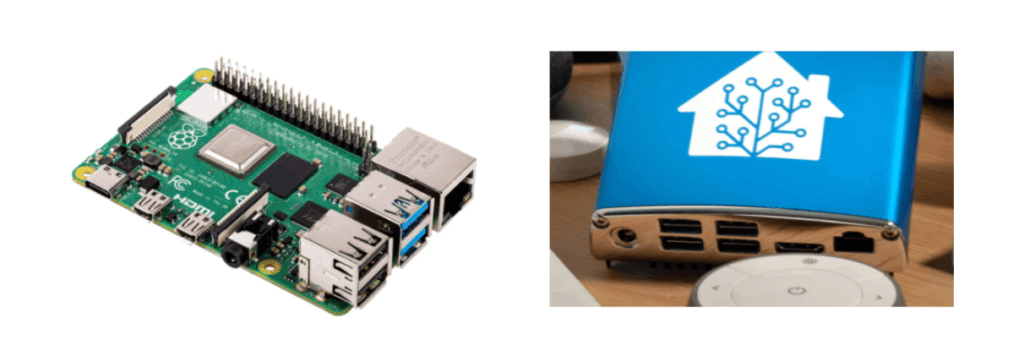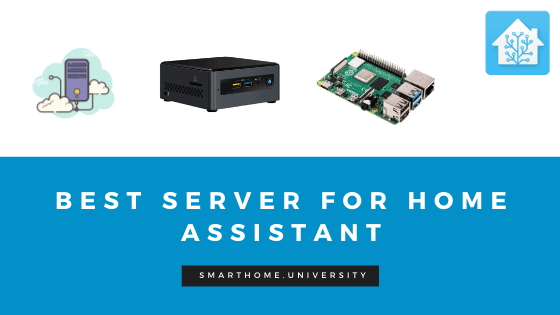- The recent Home Assistant conference made me think again about the best server options for Home Assistant
- When choosing what to run Home Assistant on, there are usually four main choices:
- Raspberry Pi ($139.99) , which gives you the modular approach, it is cheap and simple to install
- HA Blue is better than Rpi4 as it is using eMMC as the storage, vastly improving performance
- NUC ($169.00), which is a powerful machine for advanced users, with low power usage and lower running costs
- Servers – which are many types and flavors. They are power beasts (both CPU and power consumption wise) and only make sense to use if you want to run other things on those.
- In this article, we will look at 3 things to think about when deciding on the server and four power use cases for which Raspberry Pi (or Blue) might not be enough.
Also, I will explain why I currently use NUC and why I think this might be the most balanced option between ability, simplicity, and practicality.
The right hardware is key to make sure your Home Assistant setup not only runs smoothly but also easy to maintain and expand if needed. We reviewed the Best Hardware for Home Assistant before and this is a deep dive into one most important category.
The server itself does the heavy-duty in combining all of your smart home pieces together – messages from your smart devices via hub or stick, storage to keep a record of logs or pictures from cameras, and acts on your smart home automations.
3 things to decide when choosing the server for HA
There are a couple of important factors to look at when choosing the best server for Home Assistant;
- Your use cases for Home Assistant. This boils down to whether you are a power user of Home Assistant or not. The majority of users will be more than happy with the CPU of Rpi 4. But if you also want to use NVR, media server, or other add-ons, you might need to go for a more capable machine.
- Official support – Home Assistant is a very well supported piece of software, but it cannot still resolve all the potential issues for thousands of different servers it can run on. That is where the official support really plays an important role. If you do not want any hassle with easy updates and integrations, you might want to go for Pi or Blue. If you are ok with some occasional issues and ok to google things and see GitHub tickets, the world is your oyster. See the suggested hardware on the Home Assistant website for the current preferred list.
- Power consumption – this one is an important one. You do not want to pay hundreds of dollars for electricity bills annually for a piece of hardware that does not really add any significant value for you. That is why more power-efficient options like blue, raspberry pi, or NUCs might be the best for you. (as an example with the average kW cost in the US is 12 cents the cost of running NUC will be around $1 per month). One thing to remember though is that power efficiency in most cases comes at the price of computational power.

Why might Raspberry Pi or Blue not be enough for you?
Are you an average Home Assistant user?
Home Assistant is capable of many things, but for the average user, the ability to connect all different smart home devices and run powerful automation routines (now with help of Blueprints) is probably the main one.
If you are one of those, the choice is simple – you need to think about going for Home Assistant Blue or Raspberry Pi 4.
Blue Advantages:
- Official support from Nabu Casa
- High productivity storage (up to 10 times compared to Raspberry Pi)
Raspberry PI advantages
- Cheaper (c. 50$) when considering the case, sd card, and power supply
- Easy to re-purpose or sell if you upgrade in future
- Good support community
- Many extension add-ons
Personally, I think that Raspberry Pi is a more practical and better option for the average user, but supporting Nabu Casa is cool (I also really like the Blue’s case)
Do you want to use Home Assistant for other things?
My personal approach is to use Home Assistant which is a bit wider than just a smart home hub. I can see a lot of potentials to have it as a single easy to maintain the home server. I do not think it is there yet (it lacks backup and photo management in my opinion) but close enough. This means, however, that neither Raspberry Pi nor Home Assistant Blue will not be enough.
To test if this is something you might go for as well, see main uses for me:
- Home Assistant as NVR – you might know that you can install MotionEye as an add-on, but even without it, you can use built-in camera capabilities to record and store IP camera feeds. For uncomplicated setups with 4 or fewer cameras, this would work great. Also means you do not need additional apps on your phone.
- Use of AI and local object recognition – you can also use different software (for example DOODS) to recognize faces and objects. This might be handy to make sure you only have alerts if human wonders on your porch, but will require more horsepower for your machine.
- Local Media server – in the age of streaming wars this might seem excessive, but in my experience (especially having 3 kids) it is so much easier to have something stored locally. Plex is my media server of choice, but serving media especially transcoding is a CPU heavy activity.
- Backups – This is something that is not yet covered by Home Assistant add-ons. My needs are simple, I want to have a storage of files and access it via samba or SFTP. I will then upload it to an offsite backup solution (B2 from Backblaze in my case) using restic.
There are many other things you can run like VPNs (wireguard and zerotier), Ad blockers (ad-guard), Air Cast, and many more (even VoIP)
So, what am I saying here? I am saying if you commit to learning or already know a bit about managing networks, configuring more complicated devices, you might get much more out of your Home Assistant as your home server. Most importantly it is fun to deal with. If you are with me on the journey, I recommend going for something more complicated than Raspberry Pi or Blue as it might limit things you can do.
Rpi4 vs NUC: How do they compare?
As we learned above, the main choice today is between Raspberry Pi 4 (2GB or 4GB version). We cleared the question of how you can use the NUC, but what about the hardware differences. Let me give you a breakdown of main differences:
- CPU power: best compared using Passmark. RPI4 generally gives you 1200-1300 without overclocking, while NUC will be 6000 or more. While CPU is not the main item, it is pretty compelling
- Storage: Again, here Pi is just using USB or SD Cards. They will work just fine, but it is really no comparison to SATA III or NVMe speeds. Also, no more SDcard failures.
- Expansion: Here I consider to be a draw. While many NUCs (like NUC8i5BEH ($169.00)) would have additional Thunderbolt option, having 4 USB-A ports would be more than enough.
- Upgradability: this one is a win for NUC. Not only you can update RAM (not possible in Pi) but also attach HDD via SATA III.
Why do I think NUC is the best server for Home Assistant?
I personally use NUC NUC10i5FNH1 ($169.00) as my home server on which I run Home Assistant. In my case, I use Proxmox to have two systems on a single server (HA and Ubuntu 20.04). The latter is more for backups, photo management, and potentially for Nextcloud.
There are three main reasons why I think this might be the best setup:
1. I can run Home Assistant
This was important for me – I want to keep the simplicity of supervised home assistant to make sure all the updates and add-ons are easy to run. I think I will be able to handle Home Assistant Core as well (which I did before on my HP Gen 8 microserver), but it is much more fun to run pure Home Assistant.
2. I have enough CPU which is also power efficient
I decided to go for the i5 8gen version, which some might consider overkill, but in my case, it works very well with Plex, MotionEye, and backup that I am running for it.
3. It is easy to upgrade
I have bought 256 GB M.2 NVMe storage ($29.99) and 8GB memory ($28.99) which is enough for me even to transcode cartoons for my kids with Plex. But the best thing is that I can upgrade so easily:
- If I need more RAM, there is another slot available
- If more storage is needed, there is a SATA III cable that I can use. Also, there are 4 USB-A and 1 USB-C port available that are very easy to upgrade.
What do you think? Please let me know your thoughts – especially if you disagree with what I am saying here. You can use comments or twitter.
Frequenly Asked Questions
Is there a reason why I should select NUC over Raspberry PI?
If you are planning to use Home Assistant for some power features like NVR, media server, or run setups with 20+ devices you should always go for NUC.
Raspberry Pi 4 or Home Assistant Blue?
Both options are great. Blue has a benefit in using eMMC as storage, and also you will support Nabu Casa. Raspberry Pi is a bit more versatile, cheaper, and can be easily repurposed.
Would you recommend going for enterprise grade servers for home assistant?
My answer is no. This goes down to running costs. I do not believe that unless you will run complicated computational applications, having any modern CPU will be enough. Run multiple servers if you must, but in my opi
Last update on 2024-04-20 / Affiliate links / Images from Amazon Product Advertising API

Do you run HASS as a VM or do you run HASS OS?
What’s the advantage of the Intel NUC over another, similarly configured, machine?
My needs are similar to yours. I’m currently running on a rPi but it’s maxed out. I have about 40 – 50 devices connected including about 10 cameras. I would also like to run motionEye and Plex.
Last sentence is incomplete. Please complete:
Run multiple servers if you must, but in my opi….